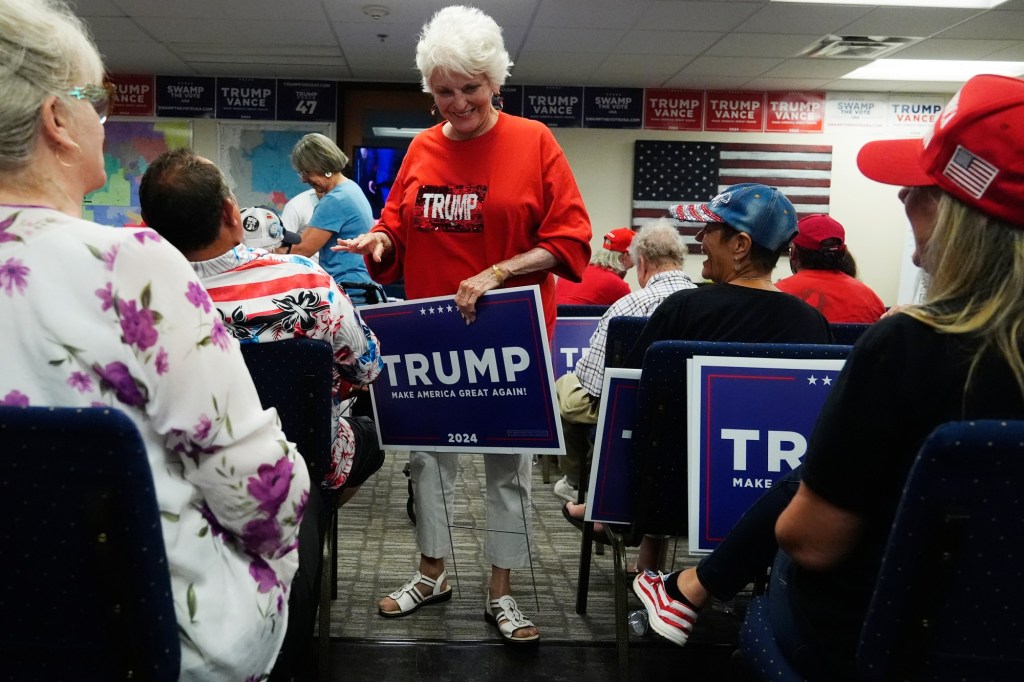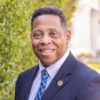
MILWAUKEE — It started with a murmur, growing louder, among Democratic allies of Joe Biden, asking him to call it quits. It exploded with the attempted assassination of Donald Trump. And it dragged on with the Republican faithful rallying around him for a third presidential nomination as the whispers around Biden began reaching something of a crescendo.
The last week in national politics, in a year already fraught with the type of high-stakes drama Americans have come to expect in the last eight years, has been a singular type of whirlwind — one, perhaps, leaving even more questions about this year’s election than it started with.
“These are the times you read about in the history books of our country, wondering, ‘What was it like to live in such a time?’” Jerry DeWolf, an Republican National Convention delegate from Washington County, said during a jubilant moment for his party Thursday night.
Trump finished his Republican convention with the party stalwarts fully behind him. Biden ended it with Democratic heavyweights like former President Barack Obama and former House Speaker Nancy Pelosi reportedly saying his chances at success are dimmer.
Former primary opponents like Nikki Haley — once questionable about whether she would back someone she said not too long ago was not fit for office — gave Trump a full-throated endorsement.
U.S. Rep. Jamie Raskin, a respected national Democratic figure from Montgomery County, told Biden there was “no shame in taking a well-deserved bow.”
“What you got was a week of Republicans together, united, happy, moving forward and, in the background, the Democratic Party tearing itself apart,” said Todd Eberly, a political science professor at St. Mary’s College of Maryland. “In my life I have not seen a party form a circular firing squad in this manner, ever. It’s almost inexplicable.”
Eberly said it’s understandable that Democrats are concerned while looking at both public and private polling that shows Biden lagging in swing states. Still, the “freakout” is severely damaging their ability to fundraise and unify so close to the election, he said. The longer it goes on, the harder it will be to recover in the coming months.
Four years after Biden won twice as many votes as Trump in Maryland, Republicans in the state are optimistic about Trump’s chances about returning to the White House, though they aren’t betting on the type of nationwide landslide that turns Maryland red for the first time since George H.W. Bush was elected in 1988.
But the momentum is real in certain parts of the state — and its extension across the country could give Trump his first popular vote win, some say.
“From the Eastern Shore, throughout Maryland and especially Western Maryland, he rocks. He’s going to rock the vote,” DeWolf said.
Wearing a faux bandage on his ear in an homage to Trump’s injury in last week’s shooting, DeWolf said from the floor of convention Thursday night that he thinks Trump will “have the hearts and souls of a good majority of the state” even if he doesn’t win all their votes.
Nationwide, though, “it’s going to be too big to rig,” he said, referencing Republicans’ continued belief that Trump’s loss in 2020 was rooted in widespread voter fraud. There has been no evidence of such widespread fraud, and courts repeatedly rejected GOP lawsuits challenging the results before the fury resulted in the Jan. 6, 2021, attack on the U.S. Capitol during the certification.
Trump this week showed no signs of backing down from those false claims as he and his followers enter another highly fraught election.
“They used COVID to cheat. We’re never going to let it happen again,” Trump said from the stage Thursday.
As he neared the end of a speech, his defiance — familiar, yet at the same time straying from some of his remarks aimed at unifying the country — was palpable.
“Nothing will sway us,” he said. “Nothing will slow us. And no one will ever stop us.”
Democrats spent the days before those comments raising the alarm about Trump’s authoritarian bent in a line of messaging they are sure to try to remind voters about in the coming months.
U.S. Sen. Cory Booker, for one, was one of a few notable Democrats to descend on Milwaukee on behalf of Biden’s campaign to highlight those and other claims. In a press conference, he called Trump’s running mate, U.S. Sen. JD Vance, an alarming choice considering his past statements that he would not have immediately certified the results of the 2020 election like then-Vice President Mike Pence did.
Republicans at the convention were quick to dismiss those concerns as they rallied around Vance, Trump and what they saw as an overall positive message.
Chris Anderson, an RNC delegate from Baltimore, said Trump deserves an opportunity after what he described as years of empty promises from Democrats.
“All I hear from my constituents all the time is give this person a chance,” said Anderson, who’s challenging Baltimore City Councilman James Torrence in District 7 this year. “We’ve been giving people a chance forever. What we need is solutions. What we need is a change. … That’s what President Trump is offering.”
Anderson, who is Black, was pleased with what he saw as “a lot of focus on African American outreach” at the convention, noting prominent speeches from model and television personality Amber Rose and U.S. Rep. Byron Donalds, a rising Republican star from Florida who Anderson said he met twice this week.
Trump made an appeal to Black Americans directly in his speech, saying they and Hispanic Americans are “being hurt the most by millions of people pouring into our country,” a message that Anderson said he believes to be true.
JoAnn Fisher, a Maryland delegate from Prince George’s County who is also Black, similarly spoke critically about the border.
“This is an outrage,” Fisher said. “I cannot believe that we as Blacks have died to vote and they walk across the border and they can vote.”
Undocumented immigrants cannot legally vote in federal elections and there is no indication they’re doing so in significant numbers in any part of the country. Some municipalities, like Takoma Park, have laws allowing non-citizens to vote in local elections.
Getting significantly more Black voters to cast a ballot for Trump is likely still an uphill battle.
About 83% of Black voters are aligned with the Democratic Party, slightly less than 88% in 2020, the Pew Research Center reported in May. In Baltimore, where 60% of the population is Black, Biden won 87% of the vote to Trump’s 11% in 2020.
Michael Steele, who served as the first Black lieutenant governor in Maryland and chairman of the RNC, said the Republican nominee won’t get more than the 8% to 12% of the Black vote that GOP presidential candidates have gotten for decades.
“They have not moved the needle with the Black community,” Steele said after addressing a group of fellow anti-Trump conservatives. “Now, will that mean some Black folks will stay home? Yeah, probably, there will be some who will do that. But they’re not voting for Trump. You’re not seeing Trump pull out 20% of the Black vote.”
Steele and others at the gathering, which was held Wednesday two blocks from the convention center, spoke bluntly about what they saw as being years away from loosening Trump’s stranglehold on their party.
Eberly, of St. Mary’s, similarly said Republicans this week had finalized their “full capitulation” to the former president.
“If there was any doubt the non-Trump wing of the party has been purged, the convention really put that to rest,” Eberly said. “As long as Trump is alive he’s going to have control over this party.”
Originally Published:


